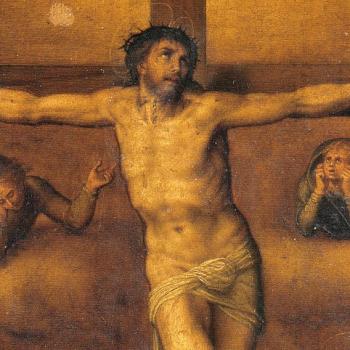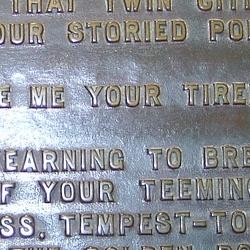
Image via Pixabay
Pope Francis has, once more, gotten himself in trouble with those bloggers he usually gets himself in trouble with. Nothing new under the sun. This time, it involves the following odd words from his homily on December 27, for the Feast of the Holy Family:
At the end of that pilgrimage [to Jerusalem, when Christ was twelve], Jesus returned to Nazareth and was obedient to his parents (cf. Lk 2:51). This image also contains a beautiful teaching about our families. A pilgrimage does not end when we arrive at our destination, but when we return home and resume our everyday lives, putting into practice the spiritual fruits of our experience. We know what Jesus did on that occasion. Instead of returning home with his family, he stayed in Jerusalem, in the Temple, causing great distress to Mary and Joseph who were unable to find him. For this little ‘escapade,’ Jesus probably had to beg forgiveness of his parents. The Gospel doesn’t say this, but I believe that we can presume it.
Naturally, the pope-bashing blogs are all over this.
What does the pope mean, Jesus “had to beg forgiveness”? they say. The pope is telling us that Jesus sinned! they say. That’s heresy! That’s blasphemy! [See here (from Novus Ordo Watch; here (from Restore DC Catholicism), here (from Roman Catholic Imperialist), here (from Suscipe Domine), here (from Vox Cantoris), here here (from The Remnant).]
***
But let’s not jump so fast. It can’t really be as simple as all that, can it? I would need much more evidence to conclude the pope thinks Christ was a sinner than a single statement in a single homily that, at worst, would merit a sincere cross-examination before I would conclude any such thing.
And not only that, but at least three times in the past year the pope has expressly affirmed that Christ was without sin.
First, on October 18, 2015, during a canonization Mass, the pope said these words:
There can be no compatibility between a worldly understanding of power and the humble service which must characterize authority according to Jesus’ teaching and example. Ambition and careerism are incompatible with Christian discipleship; honour, success, fame and worldly triumphs are incompatible with the logic of Christ crucified. Instead, compatibility exists between Jesus, ‘the man of sorrows,’ and our suffering. The Letter to the Hebrews makes this clear by presenting Jesus as the high priest who completely shares our human condition, with the exception of sin: ‘We do not have a high priest who is unable to sympathize with our weaknesses, but we have one who in every respect has been tested as we are, yet without sin’ (4:15). Jesus exercises a true priesthood of mercy and compassion. He knows our difficulties at first hand, he knows from within our human condition; the fact that he is without sin does not prevent him from understanding sinners. His glory is not that born of ambition or the thirst for power; it is is the glory of one who loves men and women, who accepts them and shares in their weakness, who offers them the grace which heals and restores, and accompanies them with infinite tenderness amid their tribulations.
Second, in his Ash Wednesday homily, on February 18, 2015, the pope had this to say:
Reconciliation between us and God is possible thanks to the mercy of the Father who, out of love for us, did not hesitate to sacrifice His only begotten Son. Indeed Christ, who was just and without sin, was made to be sin when, on the Cross, He took on the burden of our sins, and in this way He redeemed and justified us before God. ‘In Him’ we can become just, in Him we can change, if we accept the grace of God and do not allow this ‘acceptable time’ to pass in vain. Please, let us stop, let us stop a while and let ourselves be reconciled to God.
Third, in a homily in the Philippines, at Tacloban International Airport, on January 17, 2015, he said:
[Christ] is like us in everything. In everything but sin, for he was not a sinner.
The pope affirms Christ was without sin at least these three times. It is just not plausible that the pope changed his mind on a central dogma of the faith some time during the last two months, and now thinks that Christ was a sinner.
***
All this does, however, raise the key question: How are we to understand the pope’s words? For he is, by his own admission, speculating beyond what Scripture tells us. In fact, far from telling us that Jesus asked for forgiveness, St. Luke tells us that he challenged his parents: Did you not know that I must be in my Father’s house? (Luke 2:49)
It might help, in trying to answer this question, for us to look at the original Italian. The pope said:
Per questa sua ‘scappatella’, probabilmente anche Gesù dovette chiedere scusa ai suoi genitori.
The phrase in question, being translated “begged forgiveness,” is “chiedere scusa,” and it seems to have a broader application than just absolution from sin. (See here, here, and here for examples of the wide range of uses the word has.) If you bump into someone by accident in a crowd, for example, or if you cough, you would say “scusa”—or, as we do in English, “excuse me.” But no one suspects you are guilty of sin. Instead, you say it as a courtesy in a social situation.
So perhaps the pope’s meaning was to speculate (for he is speculating at this point in the homily) that Jesus may have said to Mary and Joseph something like, “Oh, I see I caused you worry. I am sorry.” That is not an admission of sin, but a giving of comfort to his worried parents.
That is possible, on a verbal analysis of the pope’s words. But the one real problem with such an interpretation is that many of the surrounding paragraphs have to do with the importance of our seeking forgiveness during the Year of Mercy. Here, for example, is the very next paragraph of the homily:
Moments like these become part of the pilgrimage of each family; the Lord transforms the moments into opportunities to grow, to ask for and to receive forgiveness, to show love and obedience. In the Year of Mercy, every Christian family can become a privileged place on this pilgrimage for experiencing the joy of forgiveness. Forgiveness is the essence of the love which can understand mistakes and mend them. How miserable we would be if God did not forgive us! Within the family we learn how to forgive, because we are certain that we are understood and supported, whatever the mistakes we make.
So from the biblical text, Pope Francis seems to draw the lesson that we too need to admit our mistakes and ask forgiveness, just like Christ. An interpretation like the one I suggest above, far from putting the pope’s words in context, seems to be taking them out of context. One would have to assume that the pope was speaking loosely and rambling around and not keeping to a consistent context. The pope never does that! Does he?
So one can be—scusami—forgiven for thinking that the pope sure seems to be saying: Do not be afraid to seek forgiveness when you sin, for in doing so you are being just like Christ after he was found in the Temple.
Let me emphasize that I do not believe that is at all what the pope had in mind. But from what the text says, I can’t exactly blame someone for scratching his head and asking: “Did the pope just say what I think he said?”
Still, we must be willing to interpret the less clear in light of the more clear, as we do in biblical interpretation. And while the pope does not say, “Jesus sinned,” he does say, “Jesus did not sin.” Even when the pope makes us scratch our head, we need to take a breath and try to work through it and not leap to accusations of heresy that don’t match up with the evidence.
***
But none of this even begins to address the pope’s odd description of the whole episode as an “escapade” on Jesus’s part. (As though Christ wandered off to play hooky.) I suspect the pope was using the word loosely, or tongue-in-cheek (for it is in quotation marks in the text, as though to underscore that he is not being literal), but it is still an odd word choice. Jesus said, “How is it that you sought me? Did you not know that I must be in my Father’s house?” These are not the words of someone describing an “escapade,” even loosely, but a duty. And he challenges his parents: Why would you not understand this?
We know that Christ was obedient to his parents and obedient to death. We know that he was baptized, though he did not need to be since he had no sin. It may not be too much to guess, as the pope does, that Christ may, at this time, have said “I am sorry,” even though, speaking strictly, he did not need to.
But that is not what this text in Luke is about. This text is about the fact that, though Christ was humble and obedient to Mary and Joseph, he had a higher obedience that he owed to God. That is why he stayed in the Temple.
And that leads me to a second possibility, which is that the pope, being someone who is prone to speak extemporaneously, simply wandered down a rabbit trail and didn’t fully think through the implications of what he was saying. He was trying to find an illustration in the text, and stumbled upon one that he did not edit before it rolled off his tongue. Who among us has not been guilty of that?
In any case, and because the pope-bashing bloggers are having a field day, this is the kind of perplexing statement that the Vatican really should come out and clarify.
***
Note: This is a slightly revised version of a post that originally appeared at Catholic Stand under the same title. Fellow apologist Dave Armstrong was of great assistance in the writing of this article, and has written his own paper on the pope’s words here.












